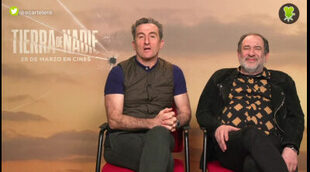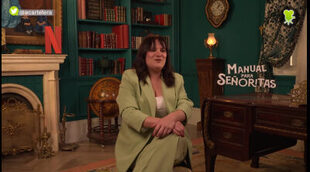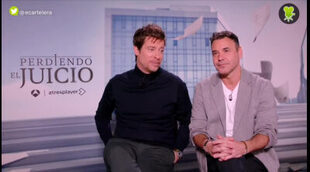Casting a glance back over the series that premiered back in 2010, it seems as though it were only yesterday. A small series by the name of 'The Walking Dead' promised to bring horror to the small screen at the hands of Frank Darabont. HBO launched 'Broadwalk Empire', a series produced by none other than Martin Scorsese. Although it lacked the renown it does today, animated hit 'Adventure Time' had also started its run. Here in the UK, we had 'Luther' and 'Downton Abbey'. Netflix was still merely an online DVD rental service that was beginning to play around with the idea of streaming, though it would still be three years until it begin its career as a producer of original content with the release of 'House of Cards'. We bemoaned that we were leaving the Golden Age of 'The Sopranos' and 'Lost', but we had no idea what television treasures awaited us.
Long Live Peak TV
-

-

-

-

-

-

The journey that awaited television lovers around the globe in 2010 was one defined by the dawn of Peak TV. What is that, you ask? Essentially, Peak TV is the pithy name given to the sheer amount of quality series on air that often provokes anxiety in the viewer due to the knowledge that they will never be able to watch all of the excellent content available. As of yet, it doesn't seem as though production rates are going to slow down anytime soon with the proliferation of more and more streaming platforms and production companies across fields as diverse as technology, telecommunications and social media. Did you know that Tinder is making a series? Even we can't keep up with the race to create new content.
Although the easiest thing to do would be to complain that we simply don't have time to watch all the series that we want to, it's equally exciting to consider the variety of content we have to choose from, all available at our fingertips. This list, which aims to represent a decade of the most outstanding examples of storytelling that television has to offer, has cost sweat, tears and, in all honesty, the occasional bit of blood during the moments in which we struggled to narrow things down. At last, however, here you have it: our list of our 15 favourite series of the decade, from 2010 to 2019.
15'The OA' (Netflix, 2016-2019)

There was nothing on television quite like 'The OA' before it aired and, unfortunately, there will be nothing like it for the next decade, either, given that Netflix has decided to cancel the series after two intense seasons. Some viewers found it difficult to connect with the plot from a narrative standpoint because the series plays with something that is as much its Achilles heel as it is its main novelty: uncertainty, doubt, not knowing what is happening but having to take a leap of faith anyway and hope that you found out - much like the protagonists. Prepare to be constantly asking yourself what is real and what is fantasy when it comes to 'The OA' - but also to fall in love with it.
The show's creator and protagonist, Brit Marling, has already sent a warning out to fans that quickly tired during the long wait between the first and second season: 'The OA' does not follow standard narrative productions nor the expectations of traditional TV and streamable content. There is a distinct, artisanal quality in each episode (which even vary in length) and in every aspect (from sound mixing to the cast itself). This is not short-lived, fleeting entertainment, but rather an audiovisual gem that deserves to be remembered even beyond this decade for its original story and daring plot development.
Written by Rafael Jiménez.
14'Broadchurch' (ITV, 2013-2017)

With its careful construction, bitter tone, gradual pacing and sweeping shots of the cold landscapes of the south of England, ITV won over critics and viewers alike in 2013 with a series that had all the makings of a classic detective drama: a crime in need of solving, a police officer with a dark past and an unexpected twist. Everyone is a suspect in 'Broadchurch', which stands out as a series for the construction of its characters, the performances and a methodical police investigation that is at once cold and deeply emotional. Before it hit streaming platforms, this lightning in a bottle formula had audiences captivated every week, much like the steady trickle of Nordic thrillers that have remained in fashion since its release. However, even with all of this under its belt, 'Broadchurch' might never have made it onto the list of the best series of the decade were it not for its third season.
After reinventing itself in its second season by shifting gears from a crime thriller to a courtroom thriller, in the third instalment of 'Broadchurch', there is no corpse nor murderer - the crime is a rape and the victim is a woman in her late forties. The series, created by Chris Chibnall ('Doctor Who') is an outstanding example of how media should discuss sexual violence, and it delivers an important message to the public: this can happen to anybody, regardless of how you look, your age, your weight, your strength. It is never your fault.
In the same year as the explosion of the #MeToo movement and the Weinstein case, 'Broadchurch' shone a light on the social stigma surrounding sexual violence in addition to the official process around handling cases of sexual aggression and rape. In examining the many flaws of this process, 'Broadchurch' points the finger at the system instead of the victim without beating around the bush but whilst also treating the subject matter with the utmost respect. It is an example of television made with awareness; television that does not have to shy away from discussing socially significant topics and making judgements in the name of "entertainment". 'Broadchurch' decided not to play it safe, but rather to challenge its viewers and to take advantage of the tropes of the genre to take the series a step further. 'Broadchurch' was brave, and it bid its farewells to television with class and style.
Written by Luisa Nicolás.
13'Paquita Salas' (Netflix, 2016 - )

Spanish series 'Paquita Salas' required just one season, perhaps even just one episode, to establish the mechanics of its own little universe which is as full of references and cultural influences as it is of huge, almost overwhelming personality. Creators and directors Javier Calvo and Javier Ambrossi won big when they decided to bet on this narrative full of nods to popular culture, noteworthy one-liners, cynicism delivered with a smile, and a particular brand of charm that has made 'Paquita Salas' a huge hit in Spain. All of this unites in a series that is expertly filmed, oozes talent and creativity, and boasts the collaborative abilities of a cast full of discoveries. The first and most important, of course, is Brays Efe, whose interpretation of Paquita Salas stands out as one of the most perfect, nuanced and unforgettable portrayals in the history of Spanish storytelling. Paquita is already a legend in Spain - so will the success of Salas be crossing the pond?
Also garnering praise are characters as memorable as Magüi Moreno, played by the always excellent Belén Cuesta; Violeta Gil, the deliciously wicked character of Ana Milán; the marvellous Anna Castillo as Belén and, of course, Noemí Argüelles, the perfect character for Yolanda Ramos to use as a vehicle for delivering some of the best moments of comedy in the entire show. Despite the heights of success already reached by 'Paquita Salas' in Spain, this web comedy show still has more to offer. Without losing the original essence of its genius, the show has continued to grow, jumping from Flooxer to Netflix, and delivered fans with a third season that brushed closer to perfection than we had ever thought possible. 'Paquita Salas' knows exactly how to walk the line between tears of laughter and pure emotion.
Written by Alberto Frutos.
12'Parks and Recreation' (NBC, 2009-2015)

Leslie Knope. Ron Swanson. April Ludgate. Andy Dwyer. Tom Haverford. Donna Meagle. Ann Perkins. Jerry Gergich. Ben Wyatt. Chris Trager. Everyone who passed through the halls of the Parks and Recreation department in the local government of Pawnee became part of one of most entertaining motley crews ever to grace the small screen. 'Parks and Recreation' was by no means the first series to utilise the mockumentary structure, but it was the first to feature Aubrey Plaza swiveling towards the camera with an expression that can only be defined as...April, and have viewers doubled over with laughter. 'Parks', as fans affectionately nicknamed the show, began in 2009 (although it wasn't released in the UK until 2013, so it counts on this list) and has continued to welcome viewers across the globe through its presence within the impressive comedy catalogue of Amazon Prime Video. Having run for half the decade and gained several new viewers through this streaming platform, we think it is more than deserving of its slot in this list on the top series of the decade. There are many reasons for this, but I'll limit myself to simply saying that I often miss these characters more than certain members of my family. And that I wish that all politicians were like Leslie Knope because things would be looking much better for us. If you haven't watched it, do yourself a favour and "treat yo self!". There are few comedies out there that will leave you in such a good mood.
Written by Jesús Agudo.
11'Please Like Me' (2013-2016)

The United States has long been the main provider of millennial comedies ('Broad City', 'Search Party', 'Girls'), but one of the very best of the genre doesn't come from that particular continent, but from Down Under. The Australian comedy series 'Please Like Me' introduced us to the idiosyncratic and neurotic world of Josh Thomas, one the sharpest and most brilliant voices of his age, and it's didn't take much for us to fall completely in love with it and with the series. 'Please Like Me' revolves around a gay guy who finds himself navigating (and often drowning in) the complexities of adult life and his relationships with his friends and family. The meaty openings, hilarious dialogue, hugely charismatic cast and perfect balance between drama and comedy made 'Please Like Me' one of the most irresistible series of the decade and made Thomas one of the most intelligent observers of human behaviour and all of its contradictions of the 21st century. Despite hitting viewers hard with painful moments and handling complex themes such as mental illness, 'Please Like Me' has the power to make anyone who stumbles upon it happy.
Written by Pedro J. García
10'Black Mirror' (Channel 4, Netflix, 2011 - )

It all began with a Prime Minister and a pig. Since that moment, which will go down in history as one of the most morally gray and brutally honest episodes in television history, Charlie Brooker has continued to delve deeper into our relationship with technology, reminding viewers that veering from advancement to dystopia is frighteningly easy. And yet, Brooker always makes it clear that the problem is not the technology itself, but rather what we see reflected back at us in that little black screen. Although 'Black Mirror' has been a series full of ups and downs (as is the case with almost all anthologies), in every season there is at least one hidden gem of an episode that manages to simultaneously be hugely original, profoundly disturbing and incredibly surprising. When it seemed as though 'Black Mirror' couldn't surprise us anymore, it went and presented us with one of the most beautiful onscreen love stories of the decade. 'Black Mirror' carries on into the next decade with us and promises a future full of either leading us to choose our own adventures or convincing us that it's for the best if we all just retreat to some dark cave. Without WiFi.
Written by Jesús Agudo.
9'The Crown' (Netflix, 2016 - )

Court gossip, first world drama and all of the secrets hidden behind palace walls, dramatic royal protocol and luxurious gems, have always fascinated us. We all love to know exactly how the rich and privileged live, but also that this perfect façade will inevitably crumble, that they also make mistakes and, of course, that they are not exempt from times of difficulty and crises. However, nobody could have convinced me before the arrival of 'The Crown' that I, a die-hard liberal, would be so invested in the British monarchy that I'm now trying to hide a genuine crush on the young Prince Charles. 'The Crown' has that something that sucks you in.
The scripts, written by creator Peter Morgan, invite viewers to examine the ins and outs of the monarchy and the politics of the time through the clever and acerbic rapport shared by the Queen and her many Prime Ministers. Such dialogue does not take the audience for fools, but neither does it require that you sit down to watch the show having done all the pre-reading. Even so, deep down it is largely a high-quality soap opera of which we know the end but not the secrets dotted throughout. 'The Crown' boasts romance, betrayal, jealous and familial arguments, is practically perfectly produced and features a hugely dedicated cast including Claire Foy and Olivia Colman as Queen Elizabeth II, John Lithgow as Winston Churchill and Vanessa Kirby and Helena Bonham Carter as Princess Margaret.
'The Crown' succeeds in the difficult task of generating sympathy for these historically self-centered, distant and enigmatic royal figures and re-teaching us the history of this country through its most iconic figurehead with humour, drama, emotion and plenty of reflections on the age, social change and the outdatedness of institutions as archaic and repressed as the monarchy in the 21st century. We don't have the slightest clue what Queen Elizabeth II really thinks of all of this, but hopefully she is as hooked on the story of her own life as we are.
Written by Luisa Nicolás.
8'Sherlock' (BBC, 2010 -)

It seems elemental now, but such a series had never occurred to anybody before Mark Gatiss and Steven Moffatt brought us their modernised take on the famous Victorian detective born from the pen of Arthur Conan Doyle. 'Sherlock' kicked off the decade at the hands of the always outstanding production team at the BBC, an undeniably crazy script, and a magnetic, three-dimensional and unforgettable protagonist. It is with 'Sherlock' that Benedict Cumberbatch can divide his career into a before and an after as he steps into the role of this well-known character who, before this series, had rarely shone so brightly in our imagination. At his side, Martin Freeman dons the guise of Dr. John Watson, a man who is as traumatised as he is bored by his daily, challenge-free life.
The pair, who boasted electric chemistry from the very pilot of this bold story, lent their mastery to the growth of the story and characters as they continued to explore the even greater depths and humanity of this dynamic duo. But it is not only the actors that make this series so magnificent. As we've mentioned already, the screenplay is exceptional, full of warped and cleverly formed lectures and sermons that only an actor of Cumberbatch's calibre could deliver. But it was also the daring visuals that evoke elements of 21st century living, of a London that is no longer so Victorian, of the fast and agile mind of its protagonist, that blew the expectations of what a television series could deliver wide open.
With 'Sherlock', TV rules were changed for the better and it's longer duration was used to benefit the story by carefully planting all of these clues that would slowly but surely carry us to each case's inevitable conclusion. Moving at a rapid, frenetic pace, full of charismatic secondary characters, impeccable style and, of course, two incredible lead characters, made this series into an unexpected and immortal treasure of recent television.
Written by Berta F. Del Castillo
7'The Good Wife' (CBS, 2009-2016)

On the impressive list of powerful female characters gifted to us by various series, particularly when it comes to the last two decades, Alicia Florrick plays an key role. The protagonist of the sublime 'The Good Wife' managed to lead by example with a series that, from episode to episode and season to season, grew and expanded its story with no small amount of passion. This evolution, both in terms of character and the series itself, would have been impossible without the collaboration and pure talent of Julianna Margulies.
Margulies was the star of a cast which also included actors of such standard as Christine Baranski, Chris Noth, Alan Cumming and Josh Charles amongst many others who added to a catalogue of illustrious secondary characters that we take our hats off to. 'The Good Wife' was a show of several brilliant and intricate working parts created by Robert and Michelle King that expertly combined a heart-attack rhyme and dialogue worthy of a standing ovation, all of which is infused with elegance, courtroom intrigue, romantic drama and classic screwball comedy. In short, we will continue to bow down for 'The Good Wife'.
PS: The show premiered in 2009 but was released in the UK in 2010, so it counts.
Written by Alberto Frutos.
6'Girls' (HBO, 2012-2017)

Lena Dunham burst onto the TV scene in 2012 as the self-proclaimed "voice of a generation" through her character Hannah Horvath on 'Girls', the HBO series created, written, produced and starring Dunham herself. 'Girls' arrived onscreen with the tagline of being the "Millennial 'Sex and the City'" before viewers realised that the show was, in many ways, the anti-'Sex and the City' of the TV universe. Following its six seasons, 'Girls' will be remembered by many for being the series in which Dunham got naked in almost every episode, as well as the exhausted debate as to whether or not she should bare all. Beyond this controversy, however, the HBO series can claim its spot at one of the most incisive, self-critical and transcendental portraits of the millennial generation, a funny yet bitter series that is full of uncomfortable truths about four pals who, in reality, were never true friends. 'Girls' always had rather low viewing ratings, but in many ways this was compensated for by its near-constant presence in cultural conversation - although this was often because of the controversy it generated rather than the quality of the show itself.
Written by Pedro J. García.
5'The Americans' (FX, 2013-2018)

Do Russian spies ponder the American Dream? This is one of the most important questions posed by 'The Americans'. The FX drama created by Joe Weisberg (an ex-CIA agent, and it shows) taught us that members of the KGB have feelings, too. Throughout the show's six-season run, we watched as married couple Phillip and Elizabeth Jennings must plough through doubts, lies and emotional turmoil to hide their true identity as Soviet government agents from those around them. Except they're not just deceiving their neighbour, who works for the CIA, but their own children, too.
'The Americans' is a spectacular thriller full of impossibly convincing wigs and prosthetics. It's a series that tackles the complexity of the Cold War from the perspective of both sides and does not shy away from pointing out the lack of scruples held by the United States government during the conflict, either. Above all, it's a drama that scrutinises the similarities and differences between who we are, who we pretend to be, and who we would like to become. All of this is shouldered by the magnificent performances given by Keri Russell and Matthew Rhys, whose real-life romance adds yet another layer to this seemingly infinite game of expectations and identities.
Written by Guillermo Hormigo.
4'Game of Thrones' (HBO, 2011-2019)

If there is any series that has defined this decade, it has to be 'Game of Thrones'. What began as a fantasy tale in the vein 'The Lord of the Rings' quickly became a world phenomenon with its own distinct style. It was a series in which the characters and the political intrigue that surrounded them seemed to push beyond the spectacular (of which there was plenty) in this world inhabited by dragons and White Walkers.
However, as 'Game of Thrones' began to distance itself from the novels of George R.R. Martin, the sheer brilliance of the show seemed to suffer as the constant evolution of the characters that had captured our minds and hearts from the beginning grew stunted. The conspiracies and betrayals gave way to great battles, which in turn led to a finale that many fans found less than satisfactory. Many fans hope to see a stronger ending feature in the book series (that is, if the saga ever reaches its long-anticipated end), whilst the rest will have to content themselves with the nostalgic memory of those nights we spent glued to the screen with our hearts in our mouths after watching the HBO logo blaze across the screen, wondering which character would end their watch that particular night.
Written by David Pardillos.
3'Fleabag' (BBC, Amazon Prime Video, 2016-2019)

Whatever their gender, faith or feelings towards Britain today, Phoebe Waller-Bridge won over legions of fans with her wry, fourth-wall-breaking glances into the camera. Perhaps this reach is the winning quality of 'Fleabag', a comedy so universal in the themes it tackles and so sincere in the way it goes about tackling them that whoever you are, it's almost impossible not to feel emotionally connected to the mishaps of this particular thirty-something Londoner.
Across just two seasons (although what a pair of seasons they are), this BBC Three and Amazon Prime Video series examines the issues and events that define the precariousness that infiltrates both the professional and personal lives of the millennial generation. Across its twelve episodes, 'Fleabag' explores loss, the complexities of family ties, the re-shaping of machismo in society, emotional instability and religion (no offense to Jude Law's turn as the pope, but Andrew Scott as the Hot Priest takes the crown as the Catholic icon of this decade's television). We owe it all to Phoebe Waller-Bridge, who also brought us the outstanding 'Killing Eve'. A new national treasure in the making.
Written by Guillermo Hormigo.
2'BoJack Horseman' (Netflix, 2014-2020)

Six years ago, an animated series revolving around a talking horse would have been written off entirely. Admittedly, in its first few episodes, 'BoJack Horseman' was perhaps not the obvious candidate for being one of the most honest narratives regarding trauma or the most brutally honest example of satire to target Hollywood of the decade...and yet, it is both of those things.
Written by Raphael Bob-Waksberg with artwork by Lisa Hanawalt, 'BoJack Horseman' is a hilarious comedy right up until the point that it catches you off guard as a devastating drama. Then, when you're still in the middle of crying your eyes out, you're shocked into side-splitting laughter once again. Over the course of the series, narrative limitations begin to blur and the series takes on an almost Cubist quality as it reveals exactly what demons BoJack's past must have held to make him into the biggest son of a bitch that Los Angeles has to offer. But there's more than that, too, because when the #MeToo era coincides with the final leg of the series, Bob-Waksberg turns his focus onto the consequences that BoJack actions have had on those around him. Is he victim or villain? Perhaps he's both. In 'BoJack Horseman', there's never an easy answer.
Written by Javier P. Martín.
1'The Leftovers' (HBO, 2014-2017)

Created by Damon Lindelof and Tom Perrotta (who wrote the novel of the same name from which the first season is adapted), this series is irrefutable proof that the art of TV storytelling is an unpredictable creature that is constantly changing, evolving, growing and consuming everything in its path.
We fell in love with the first season of 'The Leftovers', a series that depicts a world in which 2% of the world's population suddenly disappeared off of the face of the earth (with many literally fading before the very eyes of their loved ones) whilst the rest must continue with their lives without understanding the phenomenon that has occurred and without knowing whether it will ever happen again. Lindelof, Perrotta and their crew of screenwriters carry out a magnificent exploration of mourning, blame and how religious sentiment is often harnessed as a means of explaining the inexplicable.
The most surprising aspect of 'The Leftovers' when it arrived for an unbelievable and self-aware second season that pushed viewers to unexpected extremes and distanced itself from the drama of the first season without losing its transcendent quality was not only the themes tackled by the series, but also the structure and narrative resources it drew on. In that season, as well as in the even better third and final season, 'The Leftovers' became a free, funny and unique series, earning its place as the best series of the decade, and one that will continue to carry weight over the next ten years, too.
Written by Javier P. Martín.



